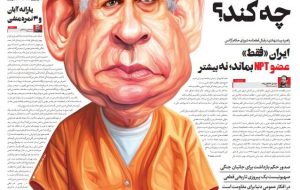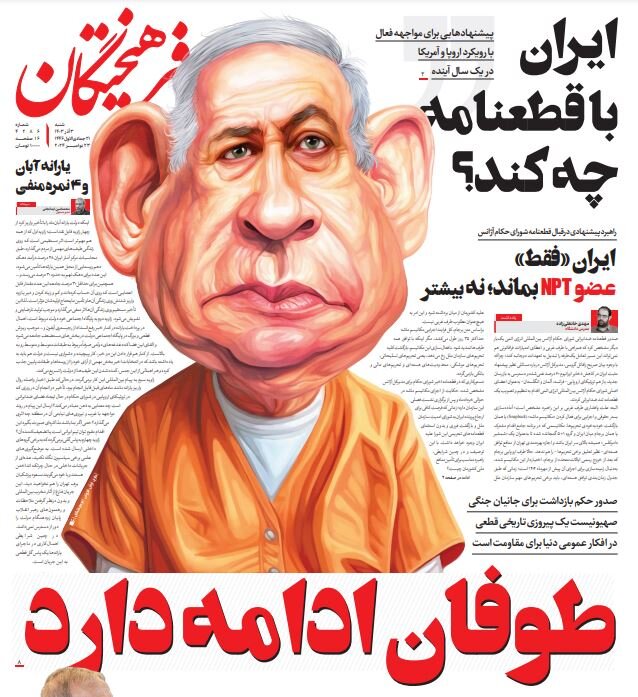Move toward the trigger mechanism
TEHRAN – In an analysis, Farhikhtegan analyzed the endorsement of the European-drafted resolution against Iran at the IAEA Board of Governors. It wrote: The recent actions of Western countries, including the European troika (Germany, Britain and France), against Iran, show that Europe has put a confrontational approach on its agenda in dealing with Iran. One


TEHRAN – In an analysis, Farhikhtegan analyzed the endorsement of the European-drafted resolution against Iran at the IAEA Board of Governors.
It wrote: The recent actions of Western countries, including the European troika (Germany, Britain and France), against Iran, show that Europe has put a confrontational approach on its agenda in dealing with Iran. One of the key goals of these countries is to lay the groundwork for the activation of the trigger mechanism. Since limits on Iran’s nuclear program will end in October 2025 based on the JCPOA, European countries are trying to use the available tools to go on with the sanctions before reaching this date. In addition, the West is trying to use Iran as leverage to convince America to support the war in Ukraine. While the President of Ukraine has clearly stated that there is no evidence of Iran’s missile assistance to Russia, Europe continues to impose new sanctions against Iran under this pretext. These unjustified sanctions show the aggressive approach of Europe to expand the range of pressure on Iran.
Javan: No need to negotiate with 5+1
In a note, Javan discussed the approval of the European-drafted resolution against Iran at the IAEA Board of Governors without consensus. The paper said: The Board of Governors of the International Atomic Energy Agency on Thursday night finally approved the resolution against Iran proposed by the three European governments (Germany, Britain and France) with the support of the United States. These countries did not even wait for Grossi’s return (from Tehran to Vienna). According to Foreign Minister Araghchi, the Iran nuclear case is now facing great complications compared to the past. Regarding these developments, there is no need to sit at the negotiating table with the 5+1 countries because many things have changed. With the current process, it is unlikely that the rest of the countries party to the JCPOA will fulfill their commitment. If negotiations are not done for a new agreement before the JCPOA expires, we will face a critical situation, and the European countries that are still party to the JCPOA may look for snapback mechanism that cannot even be vetoed by China or Russia. Deputy Foreign Minister Kazem Gharibabadi warned on Friday in response to the approval of the resolution of the Board of Governors: “If Europe implements snapback, our answer is to withdraw from the NPT.”
Etemad: Opportunities ahead
In an interview with Taghi Azadarmaki, a professor of sociology, Etemad discussed Iran’s diplomatic capacities now that the Republicans have captured the White House and won control of the two chambers of Congress. He said: We see Iran and the world community in new conditions after Trump’s rise. In his new approach, Trump disputes, argues and makes deals. However, Iran is in a different situation. Today, dealing with the sanctions is very important for Iran, and no war should happen. But peace at any cost is not suitable for Iran. Iran should adopt a two-sided approach. In fact, both the battlefield and diplomacy should be on the agenda. Applying this two-faceted policy is very sensitive and should be done together. If these two ways are followed, the Iranian society can safely overcome the existing challenges. Currently, the approach of Iranian politicians is highly important, just as military strategies are important in such a situation. The military and the politicians should present a single strategy in two forms so that Iran does not get caught in negotiations in a situation of deadlock or a war without return.
Donya-e-Eqtesad: The need to prevent activation of trigger mechanism
Donya-e-Eqtesad sought the views of Kourosh Ahmadi, a former diplomat, about the goal of the three European countries of Britain, France and Britain in crafting a resolution against Iran at the IAEA Board of Governors. Ahmadi said: The goal of the European troika was clear from the beginning and they are looking to lay the groundwork to activate the trigger mechanism. The recent resolution also has two purposes: first to set the stage for a possible activation of the trigger mechanism, and the second is a continuation of the issues (problems) we have had with the International Atomic Energy Agency over the past 4 years. These issues also include: reducing surveillances, discussing cameras and not giving visas to some inspectors, and finally demanding access to two sites that the Agency and Westerners have called suspicious. It is important to negotiate with the Western parties in these few months to prevent the activation of the trigger mechanism. The outcome of negotiations is also very important. This is while negotiation will take time. Also, according to their opinion, the European countries hope that with this resolution, Iran will either be encouraged or put under some kind of pressure and enter into serious negotiations with the other side after Trump enters the White House.
